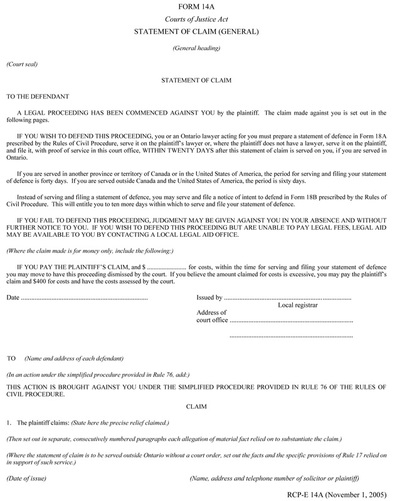What do I do if I am being sued?

If you have been served with a court document it is very important that you obtain legal advice right away. Generally this document will set out the details of a claim that someone is making against you. That person could be a bank, a business partner, a business creditor, someone who feels that they have been harmed or damaged by the conduct of your business, or anyone else who feels that they may have a claim against you for money or a reason to ask a court to interfere with the way in which you conduct your business.
In rare cases, a court may even be asked to tie up or freeze your property pending the resolution of the dispute. All of these claims are commenced by a court document which must be answered within a limited time period. In some cases, there may even be a court hearing, known as a motion, scheduled within a day, or a few days, of you receiving the document and it is essential that you respond appropriately. All court documents should be taken to a lawyer so that you know what type of claim you are facing and so that you do not miss your time limit for filing a response. If you do miss your time limit the party making the claim may be able to obtain a judgement against you without any further notice to you and with this judgement the claimant could seize all the money in your bank account or your company bank account, send a sheriff to seize your assets or your business equipment or garnishee your salary, or intercept any debts owed to you, including any money that your customers may owe to you or your business.
Even if you feel that you have no defence to the claim, it is still important to contact a lawyer who can help you negotiate a settlement. It is very often possible to work out an arrangement with creditors whereby you can pay a discounted amount, or pay over time. Even if you choose not to see a lawyer, you should contact the lawyers who have issued the claim against you, whose name will appear on the documents, in order to try and work out a settlement.
In rare cases, a court may even be asked to tie up or freeze your property pending the resolution of the dispute. All of these claims are commenced by a court document which must be answered within a limited time period. In some cases, there may even be a court hearing, known as a motion, scheduled within a day, or a few days, of you receiving the document and it is essential that you respond appropriately. All court documents should be taken to a lawyer so that you know what type of claim you are facing and so that you do not miss your time limit for filing a response. If you do miss your time limit the party making the claim may be able to obtain a judgement against you without any further notice to you and with this judgement the claimant could seize all the money in your bank account or your company bank account, send a sheriff to seize your assets or your business equipment or garnishee your salary, or intercept any debts owed to you, including any money that your customers may owe to you or your business.
Even if you feel that you have no defence to the claim, it is still important to contact a lawyer who can help you negotiate a settlement. It is very often possible to work out an arrangement with creditors whereby you can pay a discounted amount, or pay over time. Even if you choose not to see a lawyer, you should contact the lawyers who have issued the claim against you, whose name will appear on the documents, in order to try and work out a settlement.

